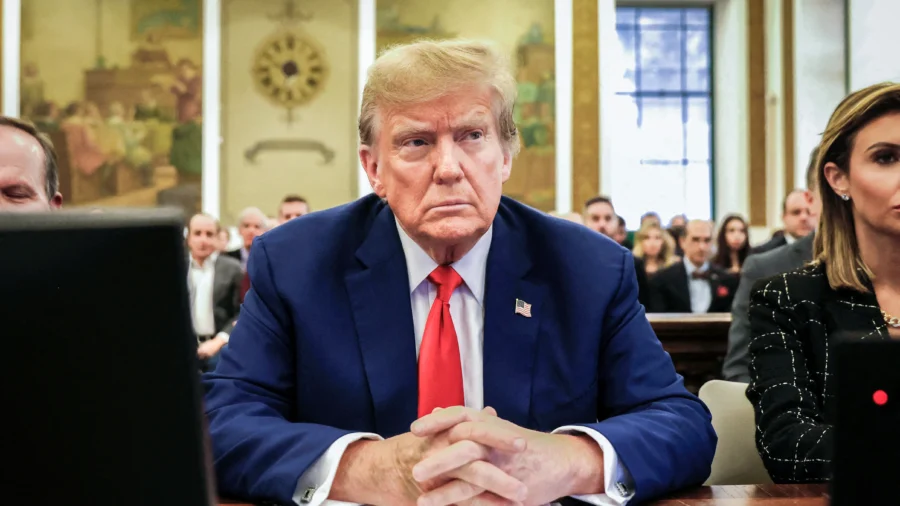The judge presiding over former President Donald Trump’s criminal case in New York has rejected his bid to postpone the trial on the grounds of prejudicial pretrial publicity.
New York Supreme Court Justice Juan Merchan said in an April 12 order and decision that he was denying President Trump’s request in part because it amounted to an untenable demand for indefinite adjournment and in part because the publicity surrounding the trial was in some measure of his own making.
President Trump sought an adjournment of the trial, currently scheduled for April 15, in light of what his attorneys described in a March 18 court filing as “exceptionally prejudicial pretrial publicity, which is substantial, ongoing, and likely to increase.”
The key premise behind the argument was that New York County, where the trial is being held, is “overwhelmingly biased” against the former president, a circumstance that is being exacerbated by prejudicial media coverage.
Prosecutors argued that the motion should be denied for three reasons. The first was that the publicity would be unlikely to recede and therefore the former president’s request amounted to an “inappropriate” request for an indefinite adjournment.
The second was that a “thorough voir dire” (the jury vetting process) would enable the parties to select an impartial jury. And the third was that President Trump’s “own incessant rhetoric is generating significant publicity, and it would be perverse to reward defendant with an adjournment base on media attention he is actively seeking.”
Justice Merchan sided with these arguments in deciding to reject the former president’s request.
“The Court agrees with the People that the proper remedy to assuage Defendant’s concerns of alleged prejudicial pre-trial publicity is by conducting a thorough, thoughtful and effective voir dire,” the judge wrote.
The Trump campaign did not immediately respond to a request for comment on the decision.
Justice Merchan’s Friday ruling represents the fourth failed attempt this week by President Trump to delay the trial.
String of Unfavorable Rulings
Earlier this week, President Trump attempted to delay the trial three times while he challenges a gag order imposed on him by Justice Merchan and as he seeks a venue change.
A panel of appellate judges will consider President Trump’s appeals but judges ruled in emergency hearings on April 8, April 9, and April 10 that these pending appeals will not pause the upcoming trial.
The April 12 ruling was not by an appellate judge but by Justice Merchan, who’s presiding over the case and who has been accused of bias by Trump counsel and has been asked to recuse himself twice from the case. The judge has already once declined to step down.
“It’s very unfair that we have this judge that hates Trump and has this tremendous conflict,” President Trump said during an April 12 press conference. “Nobody can believe this judge isn’t recusing himself, the conflict is at a level that nobody’s ever seen before.”
The April 8 rejection was tied to a change of venue request. Defense attorneys had argued that President Trump would not be able to seat an impartial jury in heavily Democrat-leaning Manhattan. The judge found that jurors’ personal political beliefs are not disqualifying factors unless they are unable to act without bias.
The April 9 ruling was related to Justice Merchan’s gag order. The judge imposed a gag order on President Trump on March 26, then expanded it on April 1 to prohibit him from making comments about the judge’s and the district attorney’s family members.
The gag order came after President Trump accused Justice Merchan of bias and corruption and later alleged that his daughter, Loren Merchan, has a partisan interest in the case because she leads a political marketing firm that has represented President Trump’s political opponents, receiving millions from them.
In opposing the gag order, President Trump’s legal team argued that he has a strong First Amendment right to make public statements about what he believes is a politically motivated prosecution.
The April 12 ruling was prompted by President Trump’s claim that prejudicial pretrial publicity would make it impossible for him to get a fair trail.
Following four successive rejections of President Trump’s requests for an adjournment, the case is set to go to trial on Monday.
The former president said at a press conference on Friday that he’s prepared to testify at the trial if called upon to do so.
What’s The Case About?
In the case, Manhattan District Attorney Alvin Bragg charged President Trump with 34 counts of falsifying business records.
Under New York state law, falsifying business records is a misdemeanor. But the charge could be elevated to a felony if the fraud was used to cover up or commit another crime.
Mr. Bragg has elevated the charge to a felony by alleging that the underlying crime was a scheme to influence the 2016 election by burying unfavorable news coverage of an alleged affair with adult film performer Stormy Daniels in exchange for $130,000 in “hush money” payments.
The former president has denied the affair and has claimed that the case is a politically-motivated “witch hunt.”
The trial was initially scheduled to start on March 25 but has been delayed until at least mid-April because of a dispute over the large amount of discovery materials produced by prosecutors.
Catherine Yang and Reuters contributed to this report.
From The Epoch Times


